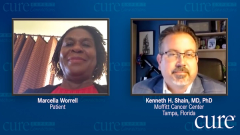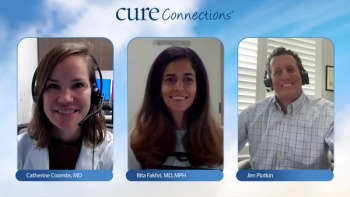
Support Networks for Patients With Multiple Myeloma
Shared insight on the importance of support networks, both medical and personal, in the treatment journey of multiple myeloma.
Episodes in this series

Kenneth H. Shain, M.D., Ph.D.: Marcella, there’s another question I want to ask you. As you started on this journey, you had support from family and physicians. But there are also organizations that can help patients. Could you walk us through your experience with that and how it may have helped you in any number of ways?
Marcella Worrell: Yes. From the very first day in the hospital, [Daniel] Spitz, [M.D., FACS,] told his nurse to tell me about other avenues available to me that offer more help. She gave me information on the Leukemia & Lymphoma Society. They helped me fill out the application right then and there. A couple of weeks later, I was in. They covered my type of blood cancer. And to this day, they’re helping me. They’ve gone the whole long journey with me.
The Leukemia & Lymphoma Society is one of the better places to go for help. First, they’ll check to see if your blood cancer is part of what they cover. Once they let you in, they’ll pay most of your copays. They’ve covered just about every bit of my copays. They’ve recently added a whole lot more to the list of things they cover as far as your CT [computed tomography] scans, medications, etc. They cover all of that. They cover your copay on your health insurance. If it comes out, they reimburse you for it. They’ve been a great help.
Kenneth H. Shain, M.D., Ph.D.: It’s a great message. You’re saying there are other avenues you need to reach out to. Hopefully patients’ local oncologists, community oncologists, or academic oncologists help them identify the resources they need to help take care of these things. Because there’s a lot of cost involved in this as well. You have to think about things like travel and drugs. There’s a cost part, but there’s also a support part.
These other institutions also have support groups that can reach out to you, so you can reach out to people who have myeloma and communicate or have social interactions so you can learn more about it. That’s the understated part of what the Myeloma Network has done. Whether it be the Leukemia & Lymphoma Society, the IMF [International Myeloma Foundation], or the Multiple Myeloma Research Foundation, all these different groups are there to try to help educate and support our patients the best they can in a number of different ways. Those are all things that are critical for us to suggest. It’s a great message to send.
Transcript edited for clarity.

